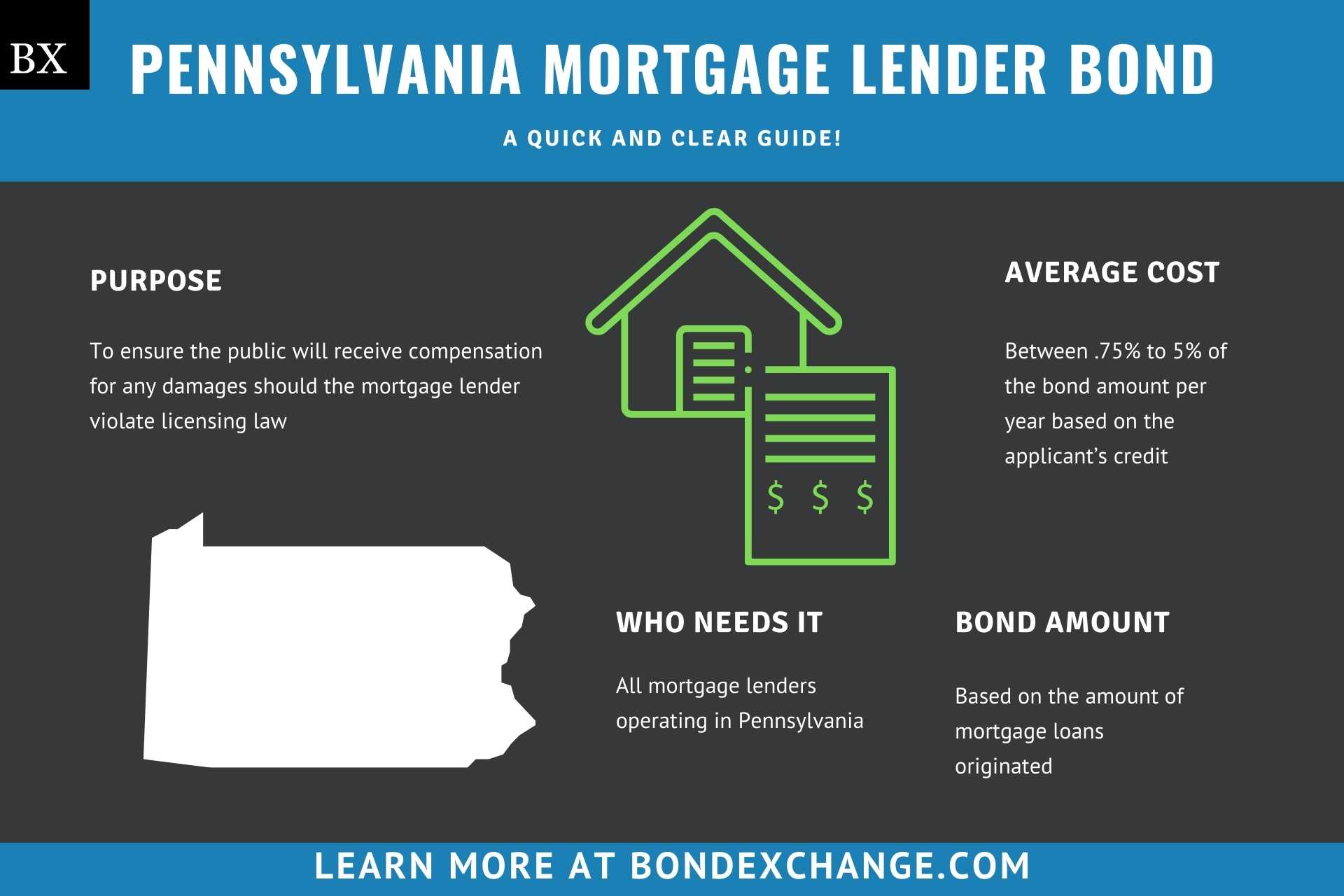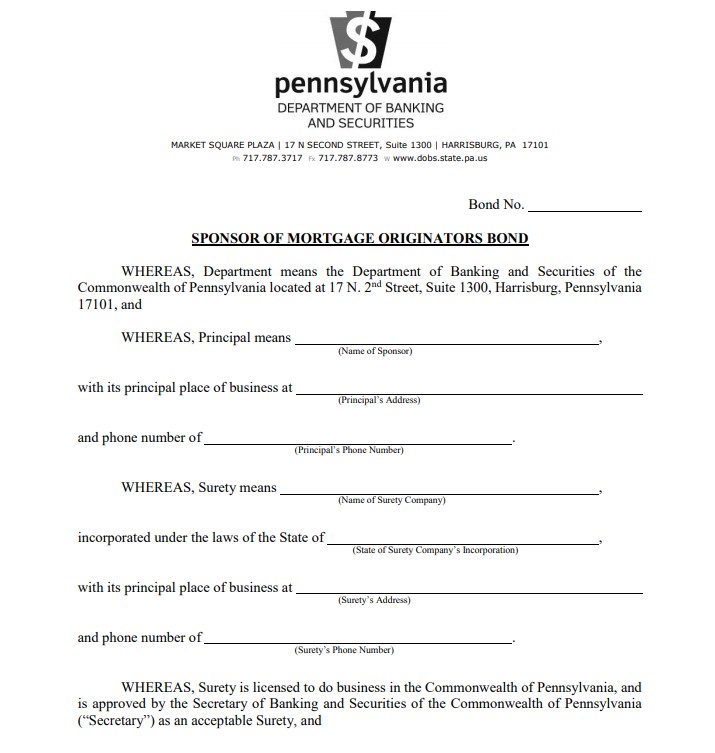Pennsylvania Mortgage Lender Bond: A Comprehensive Guide
August 18, 2021

This guide provides information for insurance agents to help their customers obtain Pennsylvania Mortgage Lender Bonds
Mortgage lenders are required to purchase both a $300,000 fidelity bond and a separate business license bond. This guide focuses solely on the business license bond. For assistance obtaining a fidelity bond, contact BondExchange.
At a Glance:
- Average Cost: Between .75% to 5% of the bond amount per year based on the applicant’s credit
- Bond Amount: Based on the amount of mortgage loans originated
Table 1.1
| Mortgage Loans Originated | Bond Amount |
|---|---|
| Less than $30 million | $100,000 |
| $30 million to less than $100 million | $200,000 |
| $100 million to less than $250 million | $300,000 |
| $250 million or more | $500,000 |
- Who Needs it: All mortgage lenders operating in Pennsylvania
- Purpose: To ensure the public will receive compensation for any damages should the mortgage lender violate licensing law
- Who Regulates Mortgage Lenders In Pennsylvania: The Pennsylvania Department of Banking and Securities
Background
Pennsylvania statute 6111 requires all mortgage lenders operating in the state to obtain a license with the Department of Banking and Securities. The Pennsylvania legislature enacted the licensing laws and regulations to ensure that mortgage lenders engage in ethical business practices. In order to provide financial security for the enforcement of the licensing law, mortgage lenders must purchase and maintain a surety bond to be eligible for licensure.
What is the Purpose of the Pennsylvania Mortgage Lender Bond?
Pennsylvania requires mortgage lenders to purchase a surety bond as part of the application process to obtain a business license. The bond ensures that the public will receive compensation for financial harm if the mortgage lender fails to comply with the regulations set forth in the Pennsylvania Mortgage Licensing Act. Specifically, the bond protects the public in the event the mortgage lender engages in any acts of fraud or breaches any contracts made with consumers. In short, the bond is a type of insurance that protects the public if the mortgage lender breaks licensing laws.

How Can an Insurance Agent Obtain a Pennsylvania Mortgage Lender Surety Bond?
BondExchange makes obtaining a Pennsylvania Mortgage Lender Bond easy. Simply login to your account and use our keyword search to find the “mortgage” bond in our database. Don’t have a login? Enroll now and let us help you satisfy your customers’ needs. Our friendly underwriting staff is available by phone (800) 438-1162, email or chat from 7:30 AM to 7:00 PM EST to assist you.
At BondExchange, our 40 years of experience, leading technology, and access to markets ensures that we have the knowledge and resources to provide your clients with fast and friendly service whether obtaining quotes or issuing bonds.
Is a Credit Check Required for the Pennsylvania Mortgage Lender Bond?
Surety companies will run a credit check on the owners of the mortgage company to determine eligibility and pricing for the Pennsylvania Mortgage Lender bond. Owners with excellent credit and work experience can expect to receive the best rates. Owners with poor credit may be declined by some surety companies or pay higher rates. The credit check is a “soft hit”, meaning that the credit check will not affect the owner’s credit.
How Much Does the Pennsylvania Mortgage Lender Bond Cost?
The Pennsylvania Mortgage Lender Bond can cost anywhere between .75% to 5% of the bond amount per year. Insurance companies determine the rate based on a number of factors including your customer’s credit score and experience. The chart below offers a quick reference for the approximate bond cost on a $100,000 bond requirement.
$100,000 Mortgage Lender Bond Cost
Table 1.2
| Credit Score | Bond Cost (1 year) |
|---|---|
| 700+ | $750 |
| 650 – 699 | $1,000 |
| 625 – 649 | $1,250 |
| 600 – 624 | $1,500 |
| 550 – 599 | $4,000 |
| 500 – 549 | $5,000 |
How Does Pennsylvania Define “Mortgage Lender?”
Pennsylvania statute 6102 defines a mortgage lender as any business entity who originates and closes mortgage loans using their own funds.
How Do Mortgage Lenders Apply for a License in Pennsylvania
Mortgage lenders in Pennsylvania must navigate several steps to secure their license. Below are the general guidelines, but applicants should refer to the NMLS’s application guidelines for details on the process.
License Period – The Pennsylvania Mortgage Lender License expires on December 31 of each year and must be renewed before the expiration date
Step 1 – Purchase a Surety Bond
Mortgage lenders must purchase and maintain a surety bond (limits outlined in Table 1.1). Lenders will also need to purchase a $300,000 fidelity bond.
Step 2 – Meet the Net Worth Requirements
Applicants for the Pennsylvania Mortgage Lender License must have a company net worth (assets – liabilities) of at least $250,000. Applicants must submit company financial statements verifying their net worth when submitting their license application.
Step 3 – Obtain a Line of Credit
Mortgage lenders are required to obtain a line of credit of at least $1 million prior to submitting their license application
Step 4 – Hire a Qualifying Individual
Mortgage lenders must employ a qualified individual who is capable of handling the day to day operations of the lending business. The qualifying individual must be a licensed mortgage originator, or meet the licensing requirements of a mortgage originator, and be employed in a management position.
Step 5 – Complete the Pre-Licensure Education
At least one management level employee must complete the required pre-licensure education course which consists of a total of 20 hours. After completion of the training course, the employee must satisfy one of the following exam requirements:
-
- Passing results on both the National and Pennsylvania State components of the SAFE Test
- Passing results on both the National and Stand-alone UST components of the SAFE Test
- Passing results on the National Test Component with Uniform State Content
Step 6 – Request a NMLS Account
The Pennsylvania Mortgage Lender License application is submitted electronically through the Nationwide Multistate Licensing System (NMLS). To submit a license application, applicants must first request to obtain an NMLS account.
Step 7 – Complete the Application
All Pennsylvania Mortgage Lender License applications can be completed online through the NMLS. Applicants must complete the entire application, and submit the following items:
-
- Company financial statements indicating a net worth of at least $250,000
- Proof of a line of credit of at least $1 million
- Company business plan containing the following information:
- Marketing strategy
- Products
- Target markets
- Operating structure
- Company formation documents
- Organizational chart detailing the company’s ownership structure
- Tax certification (per control person)
- Summary of the policies and procedures used to process consumer complaints
- The policies and procedures on how the company’s ability to repay analysis will be performed
Mortgage lenders must pay a $1,600 fee when submitting their license application.
How Do Pennsylvania Mortgage Lenders Renew Their License?
Mortgage lenders can renew their license online through the NMLS. License holders need to simply login to their account to access their renewal application. The Pennsylvania Mortgage Lender License expires on December 31 of each year and must be renewed before the expiration date.
What Are the Insurance Requirements for the Pennsylvania Mortgage Lender License?
Pennsylvania does not require mortgage lenders to purchase any form of liability insurance as a prerequisite to obtaining a business license. Mortgage lenders must purchase and maintain a surety bond (limits outlined in Table 1.1). Lenders will also need to purchase a $300,000 fidelity bond.
How Do Pennsylvania Mortgage Lenders File Their Bond?
Mortgage lenders should submit the completed bond form, including the power of attorney, electronically through the NMLS. The surety bond requires signatures from both the surety company that issues the bond and a representative from the mortgage company. The surety company should include the following information on the bond form:
- Name, address, and phone number of entity/individual(s) buying the bond
- Surety company’s name, address, and phone number
- Bond amount
- Date the bond goes into effect
- Date the bond is signed
What Can Pennsylvania Mortgage Lenders Do to Avoid Claims Against Their Bond?
To avoid claims on their bond, mortgage lenders in Pennsylvania must ensure that they follow all license regulations in the state, including some of the most important issues below that tend to cause claims:
- Do not engage in any acts of fraud
- Do not breach any contracts made with consumers
- Pay all required taxes and fees
What Other Insurance Products Can Agents Offer Mortgage Lenders in Pennsylvania?
Pennsylvania does not require mortgage lenders to purchase any form of liability insurance as a prerequisite to obtaining a business license. However, most reputable businesses will seek to obtain this insurance anyway. Bonds are our only business at BondExchange, so we do not issue other types of insurance, but our agents often utilize brokers for this specific line of business. A list of brokers in this space can be found here.
How Can Insurance Agents Prospect for Pennsylvania Mortgage Lender Customers?
The NMLS conveniently provides a public database to search for active mortgage lenders in Pennsylvania. The database can be accessed here. Contact BondExchange for additional marketing resources. Agents can also leverage our print-mail relationships for discounted mailing services.

